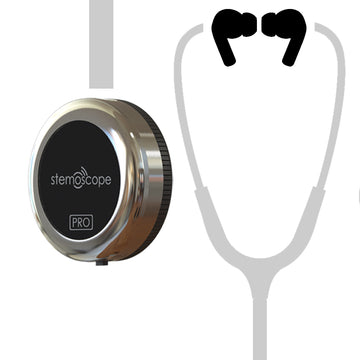A Guide to Listening to Heartbeat with Stethoscope

In today's health-conscious world, smart stethoscopes have emerged as revolutionary tools that make monitoring heart health accessible to all. Listening to heartbeat with stethoscope, once a task exclusive to healthcare professionals, is now something anyone can do with ease and precision. This guide is here to assist you on this personal health journey.
Understanding Your Device
The journey of listening to heartbeat with stethoscope begins with understanding your smart stethoscope such as Stemoscope II. Engineered for simplicity and precision, take time to explore its user-friendly features and functionalities, ensuring a seamless and informative experience.
Proper Placement for Optimal Listening
When listening to heartbeat with stethoscope, accurate placement of the device is pivotal. The heart, situated in the chest and slightly to the left, is best heard when the stethoscope's chest piece (the diaphragm side of the Stemoscope II) makes direct contact with the skin in this area. Moving the stethoscope incrementally and paying close attention to the sounds ensures you capture the clear and distinct heartbeats.
Deciphering the Sounds of the Heart
A healthy heart produces a regular 'lub-dub' sound. The 'lub' represents the closing of the atrioventricular valves, while the 'dub' is the sound of the semilunar valves closing. This rhythmic pattern is indicative of a normal, healthy heartbeat.
Identifying Irregular Heart Rhythms
An irregular heart rhythm can often be identified when listening to heartbeat with stethoscope. It manifests as an inconsistent or erratic 'lub-dub' pattern. You might notice a rapid, slow, or uneven sequence of beats, indicating a departure from the normal rhythm. Such irregularities can be initial indicators of underlying health issues and should be addressed with a healthcare professional.
Recognizing Heart Murmurs
Heart murmurs present an additional layer to consider when listening to heartbeat with stethoscope. They are characterized by an extra or unusual sound during the heartbeat, akin to a soft swishing or whooshing noise heard between the 'lub-dub' sounds. Murmurs can occur when blood flows more rapidly than normal through the heart, possibly due to a variety of reasons, not all of which are cause for concern.
Recording and Sharing with a Doctor
One of the paramount features of the smart stethoscope is its ability to record heartbeats. This facilitates an intricate review of your heart's rhythms at your leisure and provides an opportunity for sharing this data with your doctor. Such recordings can be instrumental in offering insights into your heart's health over a period of time and provide a basis for informed discussions with your healthcare provider.
Important Disclaimer
While the Bluetooth stethoscope and this guide aim to enhance individual awareness and monitoring of heart health, this should not be considered as medical advice. Always consult with a professional healthcare provider for accurate diagnosis and personalized care.
Listening to heartbeat with stethoscope has been greatly demystified and made accessible by the advent of smart stethoscopes. While these devices offer invaluable insights, they are tools for informational purposes and are meant to complement professional medical advice. All findings, especially irregularities, should be validated by a healthcare professional for an accurate assessment and appropriate management.
We'd Love to Hear From You!
Do you have any thoughts or experiences related to what we discussed today? Maybe a tip to share or a question to ask? Please feel free to leave a comment below. Your insights not only help us to improve our content but also create a vibrant community where we can all learn from each other. Don't be shy—drop us a line below!











